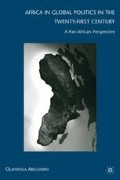Abstract
South Africa’s transition from apartheid to majority rule has been greeted both domestically and internationally with enormous enthusiasm. Here, in the midst of the mounting conflict, and confusion of the post—Cold War, is an undeniably good news story. And triumph of peaceful negotiations, and democracy over violence and many years of white racist authoritarianism in South Africa. President Mandela said:
The election of April 1994 did not set us free—but we did achieve the freedom to be free. There are new dilemmas in our new democracy, and real problems which our institutions and the media face. There are responsibilities and new challenges. Nevertheless, few would now dispute our newly won right to debate and argue about our response to those challenges. This is one of our country’s real achievements. It is another personal delight for me today to watch how the divisions of the past are giving way to the beginning of a new South African sense of belonging, shared by all3
During my lifetime I have dedicated myself to this struggle of the African peoples. I hive fought against white domination, and I have fought against black domination. I have cherished the ideal of a democratic and free society in which all persons live together in harmony and with equal opportunities. It is an ideal, which I hope to live for and to achieve. But if needs be, it is an ideal for which I am prepared to die.
—Nelson Mandela1
Access this chapter
Tax calculation will be finalised at checkout
Purchases are for personal use only
Preview
Unable to display preview. Download preview PDF.
Notes
Nelson Mandela, I Am Prepared to Die. Mandela’s speech during his trial before he was sentenced to life imprisonment in 1963, London: International Defense and Aid Fund for Southern Africa, 1979, p. 48.
Brian Lapping, Apartheid: A History, New York: George Braziller, 1989
Asmal, Kader, and Louise Asmal and Ronald S. Roberts, Reconciliation through Truth: A Reckoning of Apartheid’s Criminal Governance, New York: George Braziller, 1989.
Heather Deegan, “Excerpts from President Mandela’s Address to the Nation at his Inauguration on May 10, 1994,” The Politics of the New South Africa: Apartheid and After, New York: Longman, 2001, p. 113.
For details on the African and Southern African Crises, see the following Ali A. Mazrui, The African Condition: A Political Diagnosis. London: Cambridge University Press, 1980
Edem Kodjo, Africa Tomorrow, New York: Continuum, 1987
G.M. Carter and P. O’Meara, eds., Southern Africa: The Crisis Continued, Bloomington, IN: Indiana University Press, 1979.
Kenneth W. Grundy, Confrontation and Accommodation in Southern Africa: The Limit of Independence, Berkeley: University of California Press, 1973.
Lennart Peterson, Post Apartheid Southern Africa: Economic Challenges and Policies for the Future. New York: Routledge, 1998, pp. 27–32.
Anton Roodt, “The South African Economy,” Corporate Africa, London, issue 25, volume 1, summer 2002, p. 41.
David Mermelstein, ed., The Anti-Apartheid Reader: The Struggle against White Racist Rule in South Africa, New York: Grove Weidenfeld, 1987, pp. 189–290.
For details see Allister Sparks, Beyond the Miracle: Inside the New South Africa, Chicago, IL: University of Chicago Press, 2003.
Phyllis Johnson and David Martin, eds., Destructive Engagement: Southern Africa at War, Harare: Publishing House for Southern African Research and Documentation Center, 1986.
Joseph Hanlon, Apartheid’s Second Front: South Africa’s War against Its Neighbours, London: CIIR and James Currey, 1986.
Laurie Nathan, The Changing of the Guard: Armed Forces and Defense Policy in a Democratic South Africa, Pretoria: Human Sciences Research Council, 1994, p. 48.
Gilbert M. Khadiagala, Allies in Adversity: The Frontline States in Southern African Security 1975–1993. Athens: Ohio University Press, 1994, p. 18.
Olayiwola Abegunrin, Economic Dependence and Regional Cooperation in Southern Africa: SADCC and South Africa in Confrontation. Lewiston, NY: Edwin Meilen Press, 1990, pp. 1–32.
Denis Venter, “South African Foreign Policy Decision-Making in the African Context,” in Gilbert M. Khadiagala and Terrence Lyons, eds., African Foreign Policies: Power and Process, Boulder, CO: Lynne Rienner, 2001, pp. 162–176.
Trekkers or Trekerboers (Afrikaners), these are white settlers/farmers mostly Dutch and Germans who migrated to South Africa between 1652 and 1795 and settled in the Cape then known as Cape Colony. See Leonard Thompson, A History of South Africa, New Haven, CT: Yale University Press, 1990, pp. 33–57.
Amon J. Nsekela, ed. Southern Africa: Towards Economic Liberation, London: Rex Collings, 1981
Robert D.A. Henderson, “The Southern African Custom Union: The Politics of Dependence,” in Ralph Onwuka and Amadu Sesay, eds., The Future of Regionalism in Africa, New York: St. Martin’s Press, 1985, pp. 225–253.
Olayiwola Abegunrin, Nigerian Foreign Policy under Military Rule, 1966— 1999, Westport, CT: Praeger, 2003, pp. 80–93.
Nelson Mandela, “South Africa’s Future Foreign Policy,” Foreign Affairs, volume 72, no. 5, spring 1993, pp. 159–178.
Fred Ahwireng-Obeng and Patrick J. McGowan, “Partner or Hegemon? South Africa in Africa,” in Jim Broderick, Gary Burford, and Gordon Freer, eds., South Africa’s Foreign Policy: Dilemmas of A New Democracy. New York: Palgrave Macmillan, 2001, pp. 55–77.
See Jerome A. Singh, “Why AIDS in South Africa Threatens Stability and Economic Growth in Other Parts of Africa,” The Lancet, volume 364, No. 9449, 2004, p. 1920.
Desmond Tutu, The Rainbow People of God: The Making of A Peaceful Revolution, New York: Double Day, 1994.
See Ali A. Mazrui, A Tale of Two Africas: Nigeria and South Africa as Contrasting Visions, London: Adonis and Abbey, 2006, pp. 290–295.
Copyright information
© 2009 Olayiwola Abegunrin
About this chapter
Cite this chapter
Abegunrin, O. (2009). Post-Apartheid South Africa: New Challenges and Dilemmas. In: Africa in Global Politics in the Twenty-First Century. Palgrave Macmillan, New York. https://doi.org/10.1057/9780230623903_4
Download citation
DOI: https://doi.org/10.1057/9780230623903_4
Publisher Name: Palgrave Macmillan, New York
Print ISBN: 978-1-349-38165-4
Online ISBN: 978-0-230-62390-3
eBook Packages: Palgrave Political & Intern. Studies CollectionPolitical Science and International Studies (R0)

